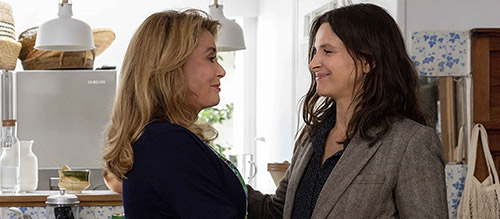The Truth (2019) Review
The Truth (2019)
Director: Hirokazu Koreeda
Screenwriter: Hirokazu Koreeda
Starring: Catherine Deneuve, Juliette Binoche, Ethan Hawke, Clémentine Grenier, Alain Libolt, Manon Clavel, Christian Crahay, Roger Van Hool
For his first film outside of Japan and not in his first language, acclaimed director Hirokazu Koreeda (Shoplifters) comes to France with The Truth, a mother-daughter film industry relationship drama that eases you in and then emotionally socks you one.
Screenwriter Lumir (Juliette Binoche) and her family visit her mother, screen star Fabienne (Catherine Deneuve) in Paris to celebrate the publication of her long-anticipated memoir. But the memoir is not even close to presenting Lumir’s truth, and as Fabienne takes on her latest role, bad blood is re-drawn in an already strained relationship between mother and daughter.
The art of film has destroyed Fabienne and Lumir’s relationship and yet it is still the only way they can really communicate with each other. They both love to scoff at which classic actors and filmmakers were better than which others, how the industry is on the downturn and how it’s becoming increasingly difficult to make great and important films these days. Many years ago Fabienne chose her career over her family, leaving others to pick up the pieces, and she sees her work on film as completely worth this sacrifice.
The inciting incident of Lumir leafing through her mother’s book and discovering the extent to which she is lying not only to herself but to her family and her avid fans is an interesting one. Fabienne’s telling of her own life story not only completely omits the invaluable contributions of Fabienne’s loyal longtime assistant Luc (Alain Libolt), but offhandedly kills off Lumir’s father Pierre (Roger Van Hool) who is still very much alive and claims that it was Fabienne, not Sarah, a fellow actress and surrogate mother to Lumir, who raised her. In reality Fabienne made her choice, choosing her career over her family and so Sarah had to step in.
Fabienne takes a small but crucial role in an arthouse sci-fi film in order to have the chance to work alongside a rising star, but she still sees her castmate (Manon Clavel) as inferior to herself in her heyday. Later comes a major revelation that sheds new light on this attitude and makes this whole character arc all the more poignant. She constantly holds classic French film stars and filmmakers (including herself) as far superior to those working today and yet struggles to keep a track of which of her contemporaries are alive and dead when giving a career retrospective interview.
The best scenes are with Binoche and Deneuve just playing off each other – Fabienne delivers withering put-down after withering put-down and Lumir barely keeps her long-suppressed anger and resentment towards her absent mother in check. Their relationship isn’t miraculously fixed after going through what they go through, but they do come to accept each other. Usually you’d have the big makeup scene, but here, after Fabienne and Lumir have a heart-to-heart, Fabienne only gets upset that she’s wasted genuine emotion on a moment when the cameras weren’t rolling.
There’s not a weak link in the supporting cast either – Hawke, Libolt and Van Hool each deliver nuanced turns as their characters orbit around Fabienne, and young Clémentine Grenier almost steals the show from the bigger stars with her pure charisma.
The portion of the film about the filmmaking process doesn’t always have the impact Koreeda thinks it does. These scenes add texture to the story but they only make the central message muddier and more pretentious. Fabienne is filming a science-fiction film where she plays an older version of a daughter who is finally able to connect with her mother who hasn’t aged, which affects Fabienne and Lumir deeply, though the way the making of the film is presented to us gets a little tedious and the meta commentary piled on meta commentary begins to grate.
The Truth isn’t quite the slam dunk that Koreeda’s best Japanese work is, but the performances are perfectly pitched and there are plenty of moments of dignified drama that really connect. A minor-key success then, and a sign that Koreeda can turn his talents to any project that comes his way.
19/24


